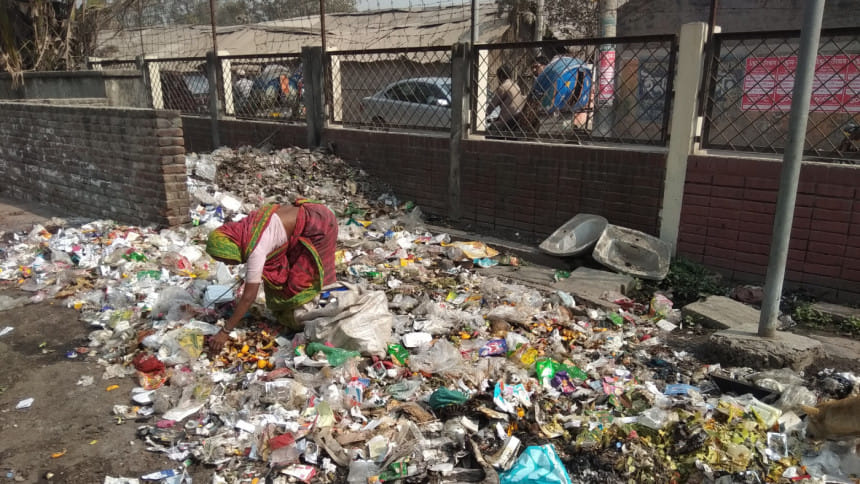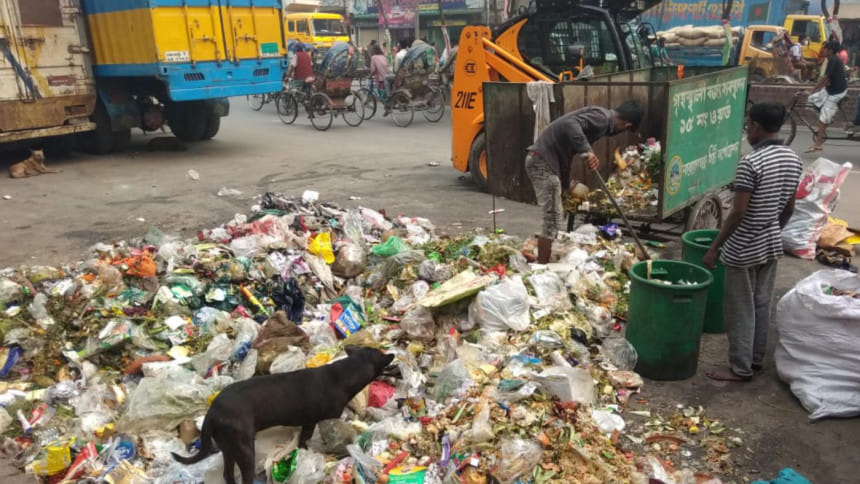Flagrant defiance behind toxicity

Piling up medical waste discarded thoughtlessly at landfills in city corporation areas pose serious threat to public health. Divisional cities, excluding the capital, have around 1,380 healthcare establishments -- public and private -- that produce over 20 tonnes of medical waste every day. To draw attention to this alarming issue, The Daily Star is highlighting medical waste management in major cities across the country. In this instalment, we look at medical waste management in Narayanganj city.
With proper disposal of medical waste being a significant issue considering public health and environment, two major government hospitals in Narayanganj are ignoring incineration service provided by an NGO.
Moreover, the hospitals are at loggerheads with the city corporation over responsibility of removing garbage from their compounds.
Authorities of the 300-bed hospital and 100-bed General Hospital say removal and disposal are not their concerns. It is Narayanganj City Corporation (NCC) that has to do it.

When asked why they are not taking service from PRISM Bangladesh Foundation -- entrusted with incinerating medical waste, authorities of the hospitals said they are already paying tax to NCC to manage garbage. So, another group should not be paid for the same purpose, they said.
On the other hand, NCC says disposing of general waste is its responsibility; healthcare facilities themselves are compelled to incinerate their medical waste.
Amid the disagreement, wastes -- medical and regular -- are not even relocated from the hospitals’ premises properly.
During a recent visit to the 100-bed hospital in Nitaiganj and the 300-bed one in Khanpur, this correspondent found all sorts of garbage left scattered on and outside the premises.
Malodour was coming from stale garbage mixed with bandages, used medicine, syringes and so on.
Talking to The Daily Star, hospitals’ authorities alleged that the city corporation does not remove those on time. NCC workers said they mostly found those in an unsorted form. Those have to be segregated, they added.
At the 300-bed hospital, plastic objects are kept in blue, syringes in yellow and infectious items in red containers at every ward, said a nurse of male medicine ward.
At the end of a day, cleaners pile those together on a dumping ground on its premises, he said wishing not to be named.
Tulshi Das, one of its cleaners, said there is no spots to dump those separately. “We know it is harmful. But, what do we do when there is no designated place?” she said.
Ansar Ali, another cleaner, said around 5-7kg of medical waste and 30-40kg of general waste are produced at the hospital on a daily basis.
Just around one year ago, harmful objects were “traditionally” burnt in pits and amputated body parts and blood were dumped in a dug up hole, he said. Later, the city corporation took those away, said the cleaner.
Now, the process cannot be followed as the hole and pits have been destroyed because of a project work to upgrade the hospital to a 500-bed one, said the worker.
He alleged that NCC trucks transport the garbage sporadically. “Sometimes they come only after phone calls and do not clear the premises properly. As a result, some garbage are left behind.”
Dr Abu Zaher, superintendent of the 300-bed hospital, said, “Once the upgradation project is finished, we will look into proper garbage management.”
On the other hand, Asaduzzaman, resident medical officer of the 100-bed hospital, said, “There has been no garbage on the premises for several days. Now, wastes are kept outside. From there, NCC workers take those to Shahidpur landfill.”
This correspondent found medical waste on a road within 50 yards of the hospital.
Asaduzzaman said medical and general wastes are segregated at every ward, but as the hospital has no disposal plant, those are dumped together. “However, the harmful ones are manually burnt. And regular garbage is taken by NCC garbage trucks.”
When asked why they don’t have their own mechanism, the medical officer said setting up an incinerator is underway. “The project is expected to be finished within several months.”
Dr Sheikh Mostofa Ali, an NCC medical officer, said, “Hospitals, clinics or diagnostic centres have been allowed to burn medical waste in pits until scientific method is ensured. The NCC has no incinerator or autoclave.”
Denying the allegations from the two government hospitals, he said they remove all sorts of wastes from those premises.
NCC Conservancy Officer Mohammad Alamgir Heron said, “We separate medical waste collected from 100-bed hospital and later burn those.”
About the 300-bed hospital, he said, “We take its regular garbage and asked the authorities to sign deal with PRISM [an NGO] to incinerate medical waste.”
Dr Abu Zaher, superintendent of 300-bed hospital, said, “Due to funding constraint, we cannot make such a deal. We appealed to the health directorate for fund allocation.”
OTHER HOSPITALS
According to NCC sources, around 107 healthcare facilities -- including the two government ones -- are in the city.
The other private ones dispose of their medical waste through PRISM Bangladesh Foundation as per agreement. The NGO incinerates medical waste in Dhaka’s Matuail.
Shahidul Islam Swapan, general manager of Popular Diagnostic Centre in Narayanganj, said they pay PRISM Tk 1,500-2,000 monthly for this purpose.
Kabir Hossain, manager and doctor of the city’s 20-bed City Life Clinic, said they pay the NGO Tk 2,000-2,500.
Mokades Ali Majumder Shaheen, general secretary of Private Hospital Owners’ Association in Narayanganj, said waste disposal would be easier and costs be reduced if the arrangement is available inside the city. “We informed the city corporation of the matter.”
In this regard, NCC Medical Officer Dr Mostofa said they are considering the issue. “We are looking for land to install such a unit.”
PRISM Coordinator Mazharul Islam said they incinerate medical waste from all private healthcare centres.
“There is no difficulty over fees,” he said, adding, “The only problem we face -- waste remains in unsorted form. In this regard, we are providing training to the hospital and clinic workers,” he said.

 For all latest news, follow The Daily Star's Google News channel.
For all latest news, follow The Daily Star's Google News channel. 





Comments